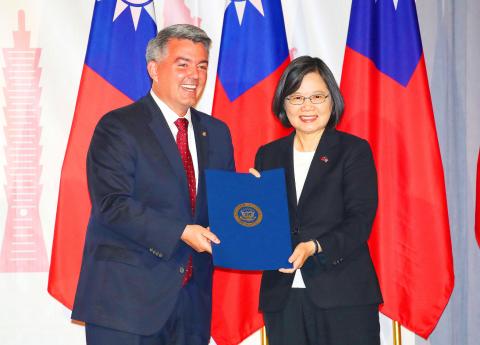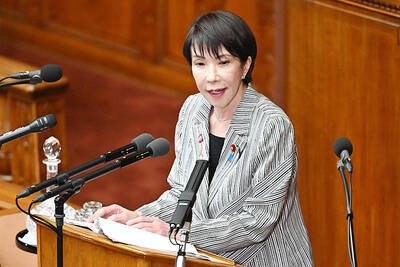US Senator Cory Gardner on Friday urged the US to stand with Taiwan as it faces growing threats, and said that ties between the two democracies are stronger than ever.
Gardner, who represents Colorado, made the remarks before joining Colorado Governor Jared Polis and about 700 Taiwanese expats at a banquet for President Tsai Ing-wen (蔡英文).
“We can look no further than Hong Kong to see the threats that Taiwan faces and the challenges that Taiwan faces. That is why it is more important than ever that we stand with Taiwan,” said Gardner, who chairs the US Senate Foreign Relations Subcommittee on East Asia, the Pacific and International Cybersecurity Policy.

Photo: CNA
He was referring to the Hong Kong protests that have erupted in response to a proposed extradition bill that would allow authorities there to extradite criminal suspects to mainland China to face trial.
Although the Hong Kong government has “indefinitely suspended” the bill, fears persist among Hong Kongers that they could lose their freedoms and rights under China’s “one country, two systems” framework.
Tsai arrived in Denver, Colorado, earlier in the day on the last stop of a 12-day trip that included a stopover in New York City en route to Taiwan’s four diplomatic allies in the Caribbean.
Shortly after Tsai’s arrival in Denver, she had a closed-door meeting with Gardner to discuss security matters, economic opportunities, the Taiwan-US relationship, a possible bilateral free-trade agreement and several other issues, Gardner told reporters.
The US government’s announcement earlier this month of a US$2.22 billion arms package to Taiwan highlighted Washington’s fulfillment of its obligations to Taipei under the US’ Taiwan Relations Act, he said.
“It is also something that we acknowledged in the Asia Reassurance Initiative Act signed into law by the [US] president on Dec. 31, where we will continue making arms sales to Taiwan, that we will regularize and routinize these kinds of sales as we continue to do more,” Gardner said.
He would continue to work with US President Donald Trump’s administration to launch discussions with Taiwan about a potential free-trade agreement, he added.
Tsai’s “historic visit” to Colorado came at a time when “the US-Taiwan relationship is at the strongest point they have ever been,” Gardner said, adding that it was the first time a sitting Taiwanese president had visited the state.
“If you look at the relationship and the support the people of the US have for Taiwan, it has never been greater,” he said.
Yesterday, he and Tsai were to discuss opportunities for cooperation in the energy industry, Gardner said.
“I think this will be a great chance for us to further show what two great democratic voices, the US and Taiwan, can do together,” he said.
Tsai on Friday also held a closed-door meeting with Polis, where they talked about Colorado’s promotion of renewable energy, and cultural and educational exchanges, National Security Council Deputy Secretary-General Tsai Ming-yen (蔡明彥) said.
Polis expressed the hope of seeing more cooperation between the two sides on higher education, given that there are about 200 Taiwanese students in Denver, he said, adding that Polis also pledged to visit Taiwan when he visits Asia next year or in 2021.

Taiwan’s exports soared to an all-time high of US$61.8 billion last month, surging 49.7 percent from a year earlier, as the global frenzy for artificial intelligence (AI) applications and new consumer electronics powered shipments of high-tech goods, the Ministry of Finance said yesterday. It was the first time exports had exceeded the US$60 billion mark, fueled by the global boom in AI development that has significantly boosted Taiwanese companies across the international supply chain, Department of Statistics Director-General Beatrice Tsai (蔡美娜) told a media briefing. “There is a consensus among major AI players that the upcycle is still in its early stage,”

‘SECRETS’: While saying China would not attack during his presidency, Donald Trump declined to say how Washington would respond if Beijing were to take military action US President Donald Trump said that China would not take military action against Taiwan while he is president, as the Chinese leaders “know the consequences.” Trump made the statement during an interview on CBS’ 60 Minutes program that aired on Sunday, a few days after his meeting with Chinese President Xi Jinping (習近平) in South Korea. “He [Xi] has openly said, and his people have openly said at meetings, ‘we would never do anything while President Trump is president,’ because they know the consequences,” Trump said in the interview. However, he repeatedly declined to say exactly how Washington would respond in

Japanese Prime Minister Sanae Takaichi said yesterday that China using armed force against Taiwan could constitute a "survival-threatening situation" for Japan, allowing the country to mobilize the Japanese armed forces under its security laws. Takaichi made the remarks during a parliamentary session yesterday while responding to a question about whether a "Taiwan contingency" involving a Chinese naval blockade would qualify as a "survival-threatening situation" for Japan, according to a report by Japan’s Asahi Shimbun. "If warships are used and other armed actions are involved, I believe this could constitute a survival- threatening

The Central Weather Administration (CWA) yesterday said it expected to issue a sea warning for Typhoon Fung-Wong tomorrow, which it said would possibly make landfall near central Taiwan. As of 2am yesterday, Fung-Wong was about 1,760km southeast of Oluanpi (鵝鑾鼻), Taiwan’s southernmost point, moving west-northwest at 26kph. It is forecast to reach Luzon in the northern Philippines by tomorrow, the CWA said. After entering the South China Sea, Typhoon Fung-Wong is likely to turn northward toward Taiwan, CWA forecaster Chang Chun-yao (張峻堯) said, adding that it would likely make landfall near central Taiwan. The CWA expects to issue a land